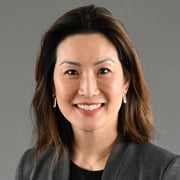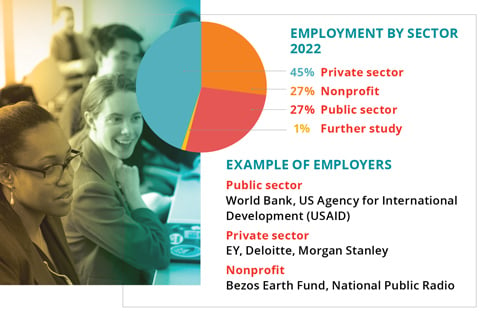Advancing a Global Affairs Career Through Graduate Education
THIS GUIDE IS NO LONGER ACTIVE. For the current FP Guide, click here.
Columbia University, School of International and Public Affairs
Diverse Campus, Flexible Curriculum Prepare Graduates for Fulfilling International Careers
 Diversity is at the heart of Columbia University’s School of International and Public Affairs (SIPA), both in its student body and graduate program learning pathways. Students hail from nearly 100 countries, with more than 50 languages spoken on campus. SIPA’s interdisciplinary, flexible curriculum includes rigorous academic study and contextual learning experiences. The combination of these elements helps foster a deeper understanding of today’s pressing global issues, from geopolitical stability to preserving democratic governance to technological innovation and its impact on people.
Diversity is at the heart of Columbia University’s School of International and Public Affairs (SIPA), both in its student body and graduate program learning pathways. Students hail from nearly 100 countries, with more than 50 languages spoken on campus. SIPA’s interdisciplinary, flexible curriculum includes rigorous academic study and contextual learning experiences. The combination of these elements helps foster a deeper understanding of today’s pressing global issues, from geopolitical stability to preserving democratic governance to technological innovation and its impact on people.
Students can pursue a Master of International Affairs (MIA) degree or Master of Public Administration (MPA) degree, both of which are 21-month programs that are well suited for early-career professionals.
“SIPA’s MIA and MPA programs each feature a core curriculum that provides a firm grounding in economics, quantitative analysis, and management,” explains Grace Han, executive director of admissions and financial aid. “In addition to these requirements, students pursue a more flexible curriculum to gain more specialized knowledge in one of several concentrations, with opportunity for additional elective study as well.”

“SIPA’s interdisciplinary curriculum and emphasis on practical skills development prepare graduates for diverse career paths in the public, private, and nonprofit sectors, both domestically and internationally.” Grace Han, Executive Director of Admissions and Financial Aid, School of International and Public Affairs, Columbia University
There is a broad range of program concentrations, which include: International Security Policy, International Finance and Economic Policy, Economic and Political Development, Human Rights and Humanitarian Policy, Energy and Environment, and Urban and Social Policy.
 A required capstone workshop elevates and distinguishes SIPA’s MIA and MPA programs from others. During this experiential learning opportunity, teams of students are positioned as consultants for real-world organizations to solve current problems.
A required capstone workshop elevates and distinguishes SIPA’s MIA and MPA programs from others. During this experiential learning opportunity, teams of students are positioned as consultants for real-world organizations to solve current problems.
SIPA students graduate prepared to work in a diverse range of organizations across sectors, but Han notes a specific trend that has taken shape in recent years. “Some are surprised to learn how many SIPA graduates enter the private sector—more than 45 percent of the members of SIPA’s class of 2022, for example, versus about 27 percent each for the public and nonprofit sectors,” Han says. “Compared to previous generations, our societies are much more willing to use public-private partnerships and other creative tools to address the challenges of public policy. This opens more opportunities for SIPA graduates, whatever sector they technically work in.”
Additionally, some graduates have chosen the entrepreneurial route, launching start-ups and social enterprises, such as Revel, Laboratoria, and openigloo. Han says that “for students who are dedicated to a start-up journey, SIPA and Columbia University are committed to providing resources and guidance,” which includes plentiful networking opportunities, professional development programs, and career advancement workshops.
Columbia University, School of International and Public Affairs
https://www.sipa.columbia.edu
[email protected]
212-854-6216![]()
Contents
- Advancing a Global Affairs Career Through Graduate Education
- Columbia University, School of International and Public Affairs
- Yale University, Jackson School of Global Affairs
- Georgetown University, School of Foreign Service
- University of Notre Dame, Keough School of Global Affairs
- The Fletcher School at Tufts University
- Johns Hopkins University School of Advanced International Studies
- Indiana University, Hamilton Lugar School of Global and International Studies
- Seton Hall University, School of Diplomacy and International Relations

